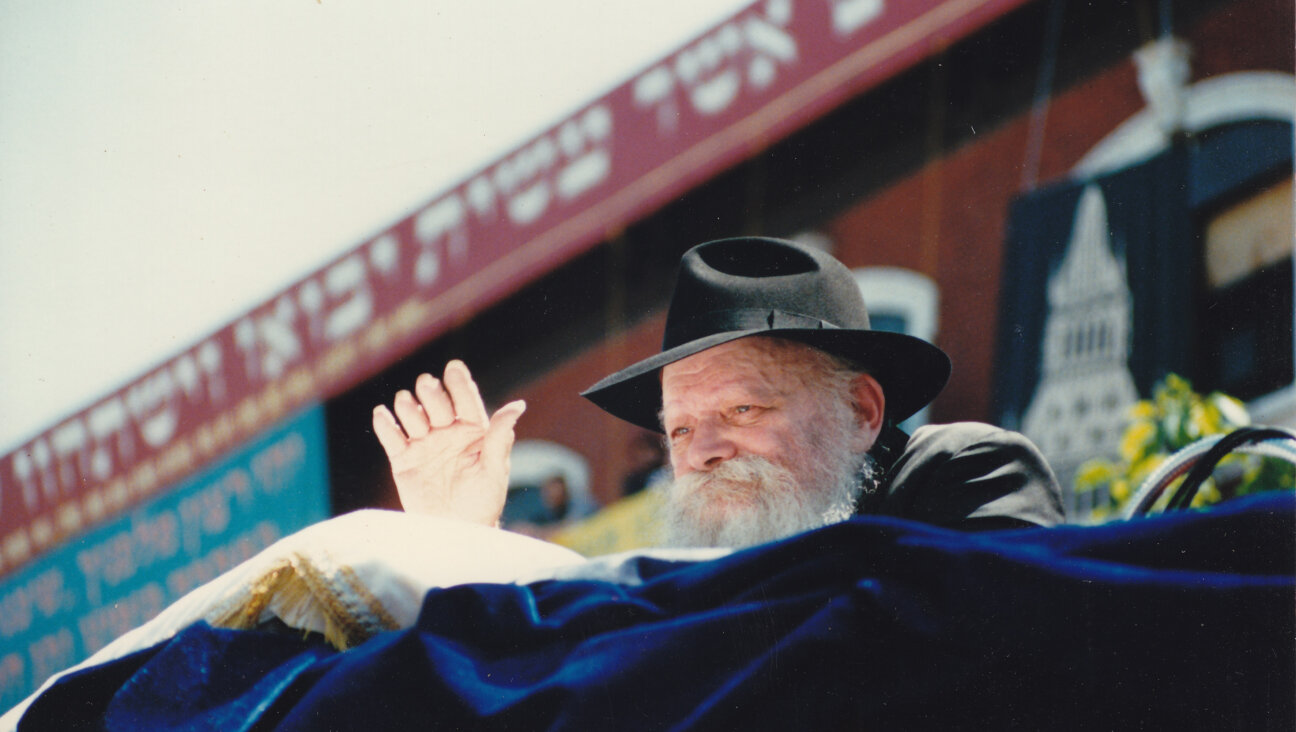August 22, 2003
Stand Up for the Roma
I read with great interest George Soros’s article on the situation of the Roma in Europe (“In Ever-Richer European Union, Roma Still Live in Abject Poverty,” August 15). While this issue is not widely known in the United States, it remains a difficult challenge for European society. Even the dark picture George Soros paints does not adequately convey the horrible conditions under which many Roma live, specifically in the countries of Central and Eastern Europe. During various trips to Hungary, the Czech Republic and Slovakia, I witnessed the slums where the Roma dwell. I was familiar with such living conditions from my trips to Colombia, where my parents were born, yet I never before imagined that such slums could exist in Europe.
All too often, the Jewish community seems to forget the traditional similarities between the Ashkenazic and Roma communities, whose shared pasts reach beyond music and expulsion. Despite a long history as travelers in Europe, almost exclusively due to expulsion and discrimination, both groups succeeded in maintaining their own identity, culture and heritage. Together their continued vitality proves that a people can exist without a land.
Even as we confront severe problems with antisemitic and anti-Israeli biases in European media and policy, the European Union of Jewish Students is determined that solidarity with other minorities, and particularly with the Roma, should be one of its priorities. In November, we will hold a seminar in Budapest titled, “Building New Bridges,” where we will establish a new level of cooperation between our two communities.
As Jews, we firmly believe that it is our task to create solidarity among minorities so that Europe will become a continent of all its citizens. In as much as we expect others to speak out against the rise of antisemitism, we must be vigilant in placing a similar onus on ourselves in the fight against hatred and bigotry.
Julian Voloj
Chairman
European Union of Jewish Students
Brussels, Belgium
A Cartoon’s Distortions
While one can take a critical position on Israel and not be antisemitic, as Philadelphia Inquirer editor Amanda Bennett maintains (“Political Cartoon Raises Ire in Philadelphia,” August 15), Inquirer editorial cartoonist Tony Auth’s depiction of Israel’s security fence — in the shape of a Star of David — as a modern-day concentration camp for Palestinian Arabs is a blatant lie and can have only one purpose: to try to convince Inquirer readers that the Jews are exerting excessive power to oppress and harm another people.
This was a tool that was used by Nazi propagandists of the 1930s and 1940s, and is commonplace in Arabic newspapers the world over today. We expect more from American newspapers than distortions and slurs.
Israel has much better uses for the millions of dollars it is spending on this security fence, but protecting its citizens from heartless cold-blooded killers bent on destroying and maiming as many Jews as they can is paramount. If the Palestinian Arabs, with their police force in excess of 20,000, would police themselves, and if Prime Minister Abu Mazen would dismantle terrorist groups, as the “road map” demands, there would be no need for this life-saving fence. Perhaps Auth could put pen to paper and convey this message to his readers. Or doesn’t the truth comport to his world vision?
Steve Feldman
Executive Director
Greater Philadelphia District
Zionist Organization of America
Philadelphia, Pa.
European Hypocrisy
The Anti-Defamation has pointed out the problematic nature of Israel’s new law denying residency permits to Palestinians who marry Israeli citizens (“ADL Rebukes Knesset Law,” August 8). I share the ADL’s concern that this is an incorrect solution to a real demographic problem.
I was, however, struck by the Forward’s statement, “The decision to speak out… puts the ADL in the unusual position of joining the European Union… in criticizing Israeli policy.” Israel’s new law is modeled after one recently passed in an E.U. member state, Denmark. The Danish law, unlike the Israeli one, does not single out a particular group of immigrants to be denied residency, despite marriage to a citizen. This is, however, universally recognized by supporters and detractors alike as a disingenuous subterfuge: The target is Muslim immigration.
By all means, let the E.U., as its ambassador to Israel threatens, examine whether the Israeli legislation violates any agreements that it has signed with Israel. But unless it applies those same standards to its own members, this will just be one more example of its hypocritical bias against the Jewish state.
Jeffry V. Mallow
National President
Labor Zionist Alliance
Evanston, Ill.
Dangerous Aspirations
Leonard Fein does a good job at excoriating Israel’s current attempts at ensuring a Jewish majority in both the Galilee and Negev (“A Jewish State, or State of Jews?” August 8). He’s not so good, however, at offering alternatives, instead reverting to what is, in fact, a racist position of his own.
Fein assumes that granted equality, the Arabs of Israel will be perfectly content to live in a “Jewish” state (whatever that means to him). He thus denies to Israeli Arabs national longings he would grant to all other peoples on Earth, including those Arabs’ brothers across the Green Line (and, one hopes, Israelis).
One must ask who is the true racist — the Israeli who admits Israeli Arabs’ desire for a state and thus recognizes the danger of an Arab majority in parts or all of Israel, or the columnist who preaches an “equal under our terms” ideology.
Nathan Lamm
Flushing, N.Y.
Teaching About Israel
An August 8 article (“Educators Aim To Move Beyond ‘Mythic Israel’”) on teaching students in Jewish schools about Israel stated “Israel education in North America is in the dumps,” according to a new study on the topic. The article goes on to say that the study found that day schools “often work to instill a love for Israel… but they neglect to teach basic aspects of the Jewish state’s history and modern culture, the Israeli-Palestinian conflict and even the Hebrew language” and “teaching venues often avoid articulating an ideological mission.”
Permit me to point out that the 82 elementary and high schools in North America of the Association of Modern Orthodox Day Schools and Yeshiva High Schools are all committed to the principle of the centrality of the Land and State of Israel for Jewish life today. All of our schools have special programming for Yom Ha’atzmaut and Yom Yerushalayim and teach the love of Israel (and Hebrew) throughout the Torah curriculum. Most, and perhaps all, of our 37 high schools have special Jewish history courses in which modern Zionism and Israel are emphasized, such as the high school advanced modern Jewish history course developed at Yeshiva University. The fact that many of our high schools send the vast majority of their graduates to study in Israel, and that almost all of those young American families who make aliya are Modern Orthodox, speaks to the success of Israel education in their homes, shuls and schools.
Currently, the association is in the process of developing a pragmatic, educationally sophisticated, Israel studies curriculum for grades one through eight. We are now in the final stages of its completion, even though we are still collecting teaching materials. We look forward to working with the Jewish Agency for Israel and American Jewish communal entities in sharing resources so that we can build upon what has been achieved by our network.
Jeremiah Unterman
Director
Association of Modern Day Schools and Yeshiva High Schools
Yeshiva University
New York, N.Y.
Mel’s Misguided Movie
In his August 1 column on Mel Gibson’s forthcoming movie about the final hours of Jesus’ life (“A Passion for Censorship”), David Klinghoffer has fallen victim to the intellectual passivity of “even-handed” thinking when he suggests that Jewish writings might have anti-Christian passages that Christians would want censored, as some Jews suggest changing Gibson’s film or Christian Passion plays. There are no such comparable passages in Jewish writing (or any other body of writing) that invariably carry a stimulus for violence. The deicide charge is unique in this respect.
As for Gibson’s film’s much-publicized commitment to historical veracity, it suffers, as does the whole tradition of the deicide charge from a paucity of evidence that Jews (some or many) were involved in Jesus’ execution. The Gospels state that the trial of Jesus was held at dawn. What bona fide governmental or religious body sits at trial on a holiday such as the Passover, in the early dawn? This would be comparable to our Supreme Court holding a trial on Christmas morning. Secondly, Judea, a client state of Rome at the time, did not have power to pass a judgment of capital punishment. Such judgments were solely in the hands of the Romans. Thirdly, any representation of Pilate as being talked into this execution contradicts everything we know about Pilate that historical documents tell us about him. These documents tell us that Pilate ruled everywhere with an iron fist and relied on his own judgment or Rome’s, not on the people he and they ruled.
Roberta Kalechofsky
Marblehead, Mass.
A message from our CEO & publisher Rachel Fishman Feddersen

I hope you appreciated this article. Before you go, I’d like to ask you to please support the Forward’s award-winning, nonprofit journalism during this critical time.
We’ve set a goal to raise $260,000 by December 31. That’s an ambitious goal, but one that will give us the resources we need to invest in the high quality news, opinion, analysis and cultural coverage that isn’t available anywhere else.
If you feel inspired to make an impact, now is the time to give something back. Join us as a member at your most generous level.
— Rachel Fishman Feddersen, Publisher and CEO























